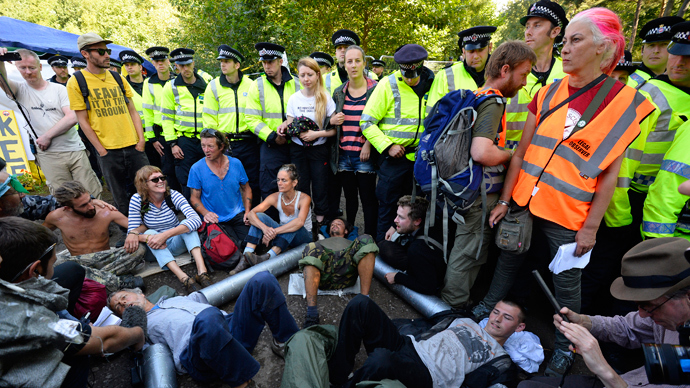No future for fracking: Renewable energy a better bet for corporations

Fracking won’t survive, says Jane Thomas, campaigner for Friends of the Earth organization. And the US success in the field can’t be repeated due to smaller territories and lower general capacities, she told RT.
RT:On one hand, hydraulic fracking [a technique in
which toxic chemicals are lowered into kilometer-deep holes
drilled in the ground to isolate gas and oil from shale] clearly
presents some environmental problems and dangers. On the other,
it might be economically profitable to actually look at this
source of energy. How can you reconcile these two conflicting
interests?
Jane Thomas: I think it’s interesting what you say about
economically profitable, so the first challenge we would say back
at the government is, “Economically profitable for whom?” It’s
quite clear in the UK context, and indeed in the European
context, that the profits are more than likely to go to
shareholders and to organizations like Cuadrilla. I think the
basic issue for us is that you cannot replicate what’s happening
in the United States with what’s happening over here. They’ve
been fracking for 20 years, they’ve got drills - 2,500 drills.
We’ve got 72 drills between the whole of Europe. So you cannot
extract at all the sort of levels that they are being able to
extract in America.
At the beginning of August, UK premier David Cameron pledged that certain communities would get 100,000 pounds “immediately” in upfront profit, in compensation for fracking on their territories. He promised the nation lower energy bills and more jobs, warning it would be a “big mistake” to miss out on the technique.
RT:On the other hand, this will create a lot of jobs
and the possibility to employ people.
JT: Where you’re more likely to get more jobs is in the
renewable sector, and one of the things we think has been really
missing from this whole debate is government stepping up to the
plate. This is the government who said it was going to be the
greenest government ever -- and actually put their money where
their mouth is and really invest in renewables. For example, in a
place called Hull, which is on the east coast of Britain, they’ve
got a potential project that the chamber of commerce projects
could bring 10,000 jobs to a much-needed, deprived part of the
country. And that’s in an offshore wind farm. We’ve seen the
Atlantic Array possibly coming on stream. The London Array just
opened. We’ve got a massive wind farm in Sussex. Those are the
one bringing real, tangible jobs.
RT:From the economic perspective, that might not be
something attractive to invest in, as there has been some
research and estimates. But speaking about shale gas extraction,
what would Britain stand to gain if it doesn’t go ahead with all
the projects?
JT: The thing is, there aren’t that many projects in the
pipeline. There’s been exploratory drilling in Lancashire, and
they’re not even fracking here in Balcombe, they’re doing some
exploration on oil and gas. So we don’t know exactly, there’s
some wild estimates there. But the reality is the industry
leaders themselves say they wouldn’t be able to have any
extraction of any merit until 2021 or 2022. So there’s no silver
bullet here and there’s certainly no short-term solution. And
there’s no evidence it’s going to bring prices down for the
consumer.
The technique of fracking has been used in the UK since the 1970s, but mostly at offshore sites.
It involves toxic chemicals being lowered into kilometer-deep holes drilled in the ground to isolate gas and oil from shale. The toxic chemicals can then float into lakes and rivers or contaminate the ground. Fracking also produces a disproportionate amount of waste, including radioactive water, which then has to be dumped somewhere. Criticism of fracking has been growing rapidly since 2007.
RT:Not so long ago, we heard of the first arrest.
People are protesting the village of Balcombe there. What is this
a sign of? Is this a sign of the government siding with
businesses instead of its citizens and not listening to their
concerns?
JT: I think it’s a number of things. We have something going
through parliament now called the Energy Bill, which has really
attracted a lot of debate about our future energy needs and, for
people like ourselves, green organizations, it’s given us an
opportunity to say, “Actually, we need to be really, really
concerned about emissions, about meeting our international
obligations in terms of carbon reduction and fracking is just
going to make this worse.” So there’s a lot of debate about
energy. There are some quite interesting things happening in
Balcombe, which is that people really haven’t felt that they have
had a proper voice through the planning system, haven’t had their
voice heard through the political system, and now they’re using
their own voice and mobilizing in a way that’s increasingly
powerful.
RT:How effective could these protests be? In other words,
can they actually stop fracking from happening?
JT: I think it adds to the whole debate. It’s interesting,
this is a conservative constituency. Francis Maude is a minister
in this government, and so it’s really happening on the
government’s backdoor. So they’re having to take notice of what’s
going on. But I think the thing that will really stop this is us
being able to make the case that this doesn’t meet our future
energy needs, it is incredibly damaging for the environment of
the people that live in those communities, and it will certainly
increase our emissions.
I think that will stop it, because if you’re a shareholder, if
you’re an investor, you have to think of the long-term prospects,
and the long-term prospects aren’t in fracking. You certainly
don’t want to go into an area where you’re going to get this sort
of level of community anger, and you certainly want to know
you’re there for a long time. And, actually, on both things,
shale doesn’t answer the question.
The statements, views and opinions expressed in this column are solely those of the author and do not necessarily represent those of RT.











